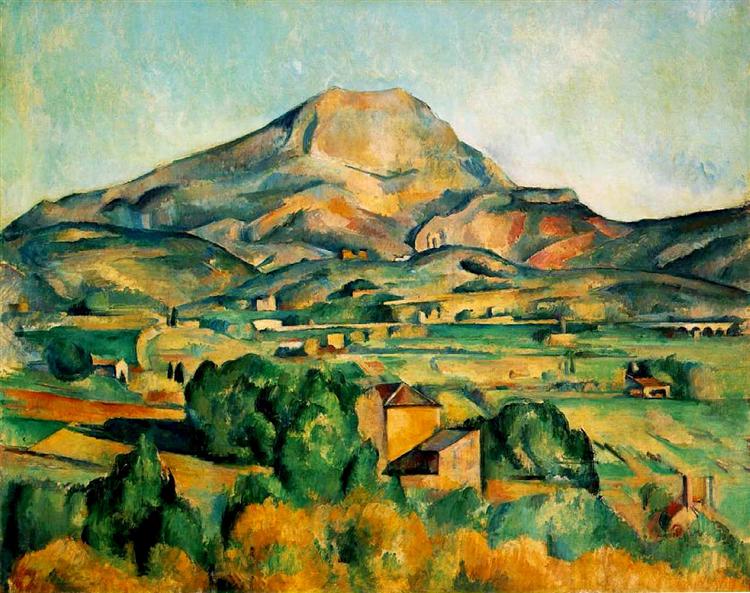Description
La peinture "Mont Sainte-Victoire", créée en 1895 par Paul Cézanne, est une œuvre fondamentale qui capture l'essence de la relation de l'artiste avec le paysage provencal, qui refléterait souvent dans son travail tout au long de sa carrière. Mont Sainte-Victoire, une montagne qui monte majestueusement près d'Aix-en-Provence, est plus qu'une simple toile de fond; Cela devient un symbole de la recherche de Cézanne pour représenter la réalité par la géométrie et la couleur. La composition artistique se caractérise par un équilibre réussi entre la montagne du centre et le paysage environnant, où les formes robustes des rochers et des arbres semblent dialoguer avec les ondulations douces de la terre.
Cézanne utilise une utilisation magistrale de la couleur qui va au-delà de la simple représentation réaliste. Sa palette combine des nuances de bleu, vert et ocre, construisant un équilibre harmonieux qui transmet la variation de la lumière et de l'atmosphère. La montagne, avec ses contours définis mais adoucis, est présenté dans un ton bleu grisâtre, qui se démarque sur un paysage plus chaud, plein de tons jaunes et verts qui suggèrent la fertilité de la végétation environnante. Les arbres, représentés avec des coups de pinceau lâches et une intensité chromatique qui lance presque, offre un sentiment de profondeur et trois dimensions.
La technique d'application de la peinture, que Cézanne domina, se caractérise par l'utilisation de coups de pinceau courts et denses, ainsi que par une construction presque architecturale de formes. Cette approche défie non seulement les conventions de la peinture impressionniste de son temps, mais établit également un pont vers les mouvements modernes, préfigurant le cubisme. En ce sens, "Mont Sainte-Victoire" présente un plan visuel qui invite le spectateur à contempler la relation entre la forme et la structure, au lieu d'apprécier simplement la beauté du paysage.
Un aspect intéressant et souvent discuté de ce travail est l'absence de figures humaines. La décision de Cézanne de ne pas inclure de personnages suggère un désir de concentrer l'attention du spectateur dans la nature, un reflet de sa philosophie artistique qui privilégie le paysage comme une entité autonome et spirituelle. Cette représentation de l'espace naturel en tant que sujet à part entière est un pilier de l'art moderne, et Cézanne l'a serrée dans ses bras avec la ferveur d'un pionnier.
"Mont Sainte-Victoire" fait partie d'une série d'œuvres que Cézanne a faites sur cette montagne, chacune variant dans ses approches de composition et son traitement de couleur et de lumière. Grâce à ces œuvres, l'artiste a cherché non seulement à capturer l'essence du paysage provencal, mais aussi à développer un langage visuel qui a transcendé la simple représentation. Il convient de noter que son travail était fondamental dans l'évolution de la peinture vers le XXe siècle, laissant un héritage puissant qui influencerait de nombreux courants artistiques, du fauvisme au cubisme.
En conclusion, «Mont Sainte-Victoire» est une méditation sur la nature et un examen approfondi de la perception qui va au-delà d'une simple image de paysage. Grâce à sa composition, son traitement des couleurs et son omission de la figure humaine, Cézanne nous offre non seulement un regard sur un endroit particulier, mais aussi une réflexion sur la façon dont nous vivons et comprenons le monde qui nous entoure. Cette œuvre sublime reste un témoignage du génie de Cézanne et de son rôle crucial dans l'histoire de l'art.
KUADROS ©, une peinture célèbre sur votre mur.
Peintures à l'huile fabriquées à la main, avec la qualité des artistes professionnels et le sceau distinctif de KUADROS ©.
Service de reproduction des images avec garantie de satisfaction. Si vous n'êtes pas complètement satisfait de la réplique de votre peinture, nous remboursons votre argent à 100%.

